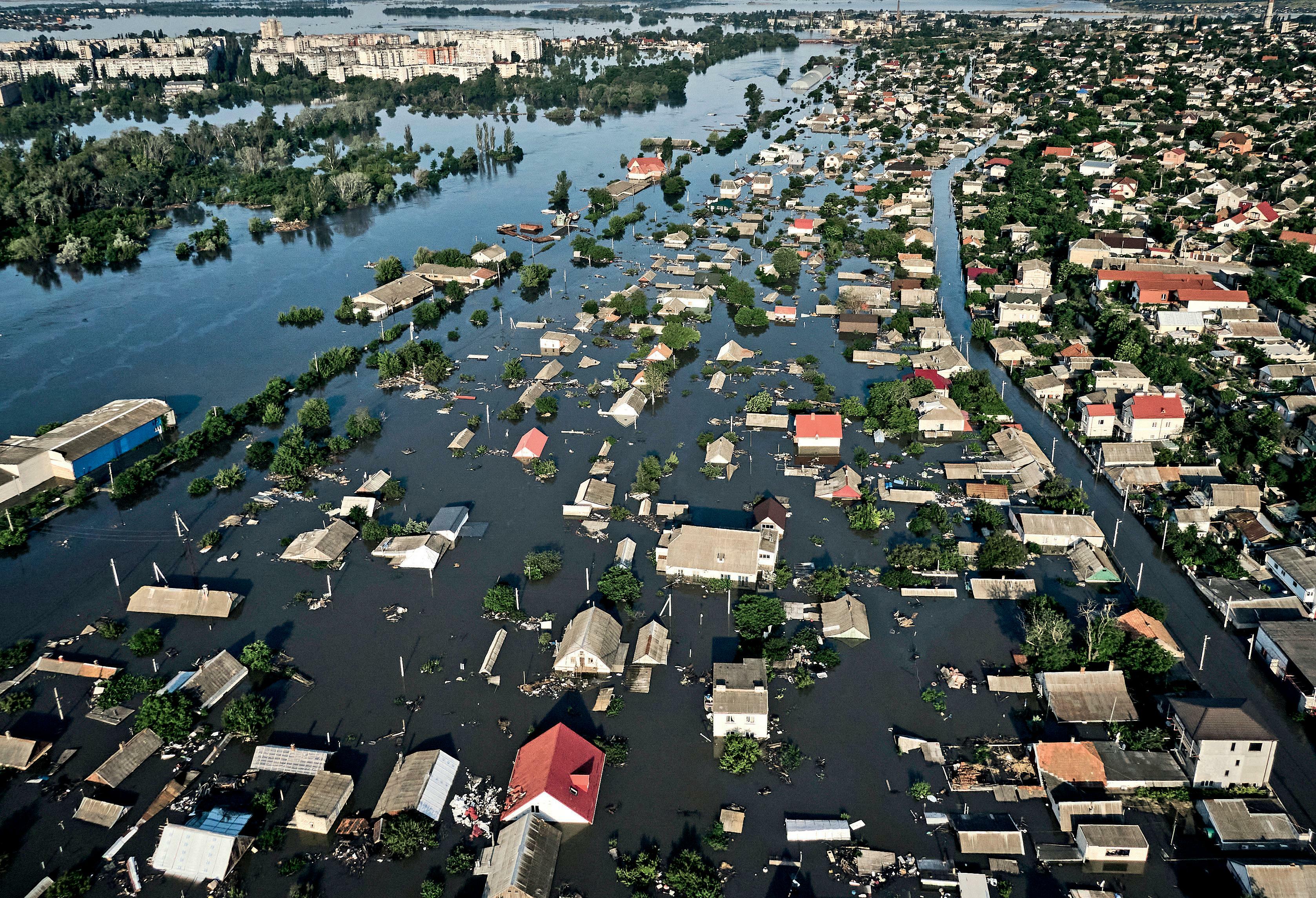
Last weekend, four-and-a-half days after Ukraine's Kakhovka dam burst, the longer-term scale of the flooding disaster was gradually becoming apparent. In the station at Mykolaiv, the first city inland, pensioner Olena Lysiuk said she had no choice but to quit her apartment in Kherson, even though it was too high up to be flooded.
"It's not just that we don't have any water, gas or electricity. We have also got used to not having those during the Russian occupation. But now the sewerage doesn't work. That's the new problem," Lysiuk said. She planned to stay in Mykolaiv with relatives, with the state having given her about 10,000 hryvnia ($270) in support.
Vasyl Chornyi got off an evacuation carriage from Kherson while the train was joined to another. The Inhulets river flooded part of his village, Fedorivka, 30km north-east of Kherson, and while his house wasn't directly affected, he too was leaving because "we fear a pandemic".
"The cemetery is drowned, the sewers have been drowned," Chornyi said. "When the waters go down, there will be lots of dead fish, other decay. In Kherson, the wells are spoiled. Outside toilets are flooded," he said. He acknowledged that, while the Russian occupation between March and November had not forced him out, the flooding disaster had.
Whole houses have been washed into the Black Sea. Last Friday an intact roof ended up on a beach in Odesa, more than 200km away. People in the city have been told not to try to clean up the rubbish, reeds and other waterborne detritus amid concern that landmines could be floating dangerously within. That leaves the clean-up to the already stretched state emergency services.
Denne historien er fra June 16, 2023-utgaven av The Guardian Weekly.
Start din 7-dagers gratis prøveperiode på Magzter GOLD for å få tilgang til tusenvis av utvalgte premiumhistorier og 9000+ magasiner og aviser.
Allerede abonnent ? Logg på
Denne historien er fra June 16, 2023-utgaven av The Guardian Weekly.
Start din 7-dagers gratis prøveperiode på Magzter GOLD for å få tilgang til tusenvis av utvalgte premiumhistorier og 9000+ magasiner og aviser.
Allerede abonnent? Logg på

The Saudi football World Cup is an act of violence and disdain
Well, that's that then. In the event there were only two notes of jeopardy around Fifa's extraordinary virtual congress last week to announce the winning mono-bids, the vote without a vote, for the right to host the 2030 and 2034 football World Cups.

AI has made the move into video and it's worryingly plausible
I recently had the opportunity to see a demo of Sora, OpenAI's video generation tool, which was released in the US last Monday, and it was so impressive it made me worried for the future.

With tyrant Assad ousted, Syrians deserve support and hope
Last week, time collapsed. Bashar al-Assad's fall recalled scenes across the region from the start of the Arab spring almost 14 years ago. Suddenly history felt vivid, its memories sharpened. In fact it no longer felt like history.

TV
The Guardian Weekly team reveals our small-screen picks of the year, from the underground vaults of post-apocalyptic Fallout to the mile-high escapism of Rivals

Albums
Murky love stories, nostalgic pop and an in-your-face masterpiece captured our critics' ears in 2024

Film
Visual language, sound, light and rhythm are to the fore in the best movies of the year

Hidden delights Our 24 travel finds of 2024
Guardian travel writers share their discoveries of the year, from Læsø to Lazio

'It's really a disaster' The fight to save lives as gang war consumes capital
Dr James Gana stepped out on to the balcony of his hospital overlooking a city under siege. \"There's a sensation of 'What's next?'. Desperation is definitely present,\" the Médecins Sans Frontières (MSF) medic said, as he stared down at one of scores of camps for displaced Haitians in their country's violence-plagued capital.

Trailblazers The inspiring people we met around the world this year
From an exuberant mountaineer to a woman defiantly facing the guns of war, here are some of the brave individuals who gave us hope in a tumultuous 2024

Votes of confidence
From India to Venezuela and Senegal to the US, more people voted this year than ever before, with over 80 elections across the world. With rising authoritarianism and citizen-led resistance revealing its vulnerabilities and resilience in the face of unprecedented challenges, has democracy reached its breaking or turning point?